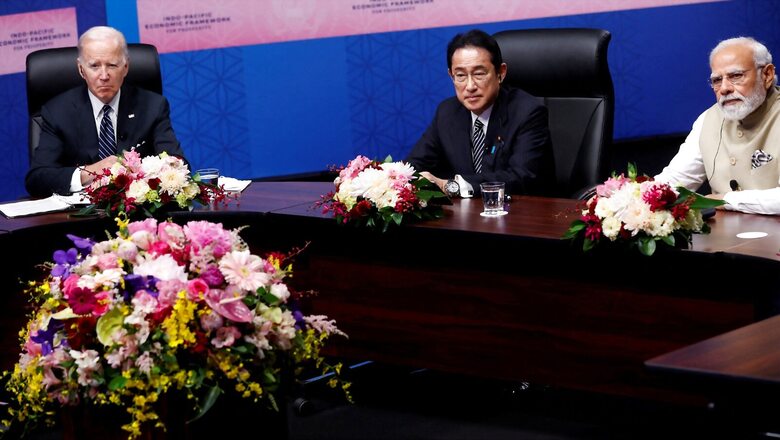
views
Leaders from Australia, India, Japan and the United States will meet for the second in-person Quad summit in Tokyo on May 24. The consistent engagement of the Quad leaders and commitment to ensure a rules-based order in the Indo-Pacific has led to further alignment and synergies among Australia, India, Japan and the United States. Contrary to speculations that the Indo-Pacific will be sidelined due to the ongoing Russia-Ukraine War, major stakeholders’ commitment to the Indo-Pacific remains strong. Furthermore, despite leadership changes in three of the four Quad countries in over a year, the grouping is showing no signs of weakness.
Keeping in view Quad’s commitment to protect a rules-based order, it is but natural for its members to address the elephant in the room: the cross-Strait relations and security threat looming large over Taiwan. It is important that the Quad countries envisage an Indo-Pacific that is truly inclusive and thereby, includes Taiwan issue in the debates. Taiwan’s inclusion in the Indo-Pacific construct warrants a serious discussion.
The four Cs – Commerce, COVID-19 pandemic, Climate Change and China – are intrinsic to the Quad, and this is also where Taiwan’s inclusion is of vital importance.
While China is one of the founding members of the Regional Comprehensive Economic Partnership (RCEP) and has applied for the Comprehensive and Progressive Agreement for Trans-Pacific Partnership (CPTPP) membership, Indo-Pacific would not be complete without having strong economic foundations. The United States President Joe Biden has officially launched the Indo-Pacific Economic Framework for Prosperity (IPEF) in Tokyo. The Quad members along with nine other countries have endorsed the IPEF, which is widely speculated to be a framework of rules rather than a free trade agreement. While Taiwan has shown interest in being a part of the IPEF, no decision to that effect has been made yet.
Once the IPEF is further consolidated in near future, it will be vital to include countries such as Taiwan in the IPEF that are a critical part of the regional supply chain. It would also provide a platform to Taiwan to interact with like-minded countries.
Taiwan was unable to attend the 75th World Health Assembly held on May 22. Taiwan, which is dealing with a surge in Omicron cases, should be a part of the high-level discussion and global solution to the pandemic. One of the mandates of the Quad is to provide vaccines to the countries in need through its working groups on the vaccines. Taiwan’s pandemic policies are similar to that of the Quad countries. Cooperation and collaboration with like-minded countries to effectively manage the pandemic is one of the major objectives within the Quad framework. Making it a part of Quad’s pandemic-control drive would prove prudent in pushing for a global response to the pandemic.
The uneven global response to climate change could lead to catastrophic consequences. Quad already has a working group to effectively deal with the issue of climate change. Climate change is slowly taking an important place in the mainstream discussion in Taiwan too that is striving for net zero carbon emission by 2050.
There are no two viewpoints that China’s aggression has been a driving factor for several countries’ cooperation and interest in the Indo-Pacific. China is proving to be an existential threat to both India and Taiwan. The United States, Japan and Australia have already supported Taiwan and are concerned about the future of regional security. Taking note of this challenge, Joe Biden in Tokyo responded to a media query and said that the United States will use force to defend Taiwan in case China attacks Taiwan.
India that is also facing similar challenges in the face of aggressive China is yet to openly talk about Taiwan. The other Quad countries have been vocal on Taiwan and even extended support to Taiwan for its participation in the World Health Assembly.
For India, deterioration in relations with China is a factor here. The ongoing military standoff along the border, China’s rising aggression towards India are some of the challenges that keep India preoccupied at the bilateral front. In such a situation, Quad provides a platform for India along with other members to talk about Taiwan. There is no doubt that any eventuality in the cross-Strait will have an impact on India as well. India should separate bilateral equations from regional issues. Australia, Japan and the United States should keep the spirits high to discuss Taiwan and strive for a collective response to deal with China’s aggression in the Indo-Pacific. Including Taiwan in the agenda will only benefit the Quad to deal with the future challenges.
China’s aggression against Taiwan poses a challenge not just to Taiwan but any country that stands committed to protecting a rules-based order. No man is an island and no country should be isolated given the threats imposed by the pandemic and revisionist powers seeking hegemonic status. For Quad to be inclusive, it is timely to discuss the vulnerabilities of Taiwan as well as its utility in a more constructive and inclusive manner.
ALSO READ | The Indian Community in Taiwan is Small but Strong, Time New Delhi Appreciates It
Sana Hashmi is a visiting fellow at the Taiwan-Asia Exchange Foundation. She tweets @sanahashmi1. Alan Yang is distinguished professor and deputy director of the Institute of International Relations at National Chengchi University. The views expressed in this article are those of the authors and do not represent the stand of this publication.
Read all the Latest Opinions here




















Comments
0 comment